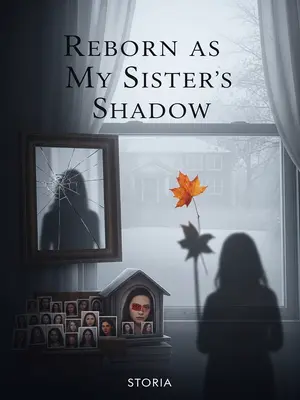Chapter 1: The Stranger in My Sister’s Eyes
I’m the number one beauty in the city.
My little sister says this in the psych ward, her voice echoing off the sterile walls. I blink, trying to process it. Maybe you’d laugh if you were sitting here with me, but right now, it just makes my chest ache. Yeah, that’s my perspective—older sister, front row seat to the weirdest show in town.
The words hung in the air, almost comical if they weren’t so heartbreaking. The linoleum floors shone harshly under the fluorescent lights, and the faint smell of disinfectant made everything feel even more surreal. My sister, sitting there in her hospital gown, chin up like she was about to walk a red carpet instead of waiting for a doctor, had never looked so out of place. I almost laughed, but it hurt too much.
"Alright, number one beauty, just wait here a minute. We’ll need to do a head CT, okay?" the doctor said, glancing at my parents as he handed them the slip—voice brisk, practical, like he’d seen it all before.
My dad tried to smile. It didn’t work. Mom squeezed my hand, her knuckles white, while the doctor’s words seemed to echo down the sterile corridor. I caught my sister’s eye—she looked almost proud, chin lifted, as if she’d just been crowned prom queen instead of being sent for a brain scan.
Ever since my sister came down with a high fever last month, she’s been acting all mysterious. And I mean, mysterious in a soap opera kind of way—like she’s got a secret identity. She claims her name is Lila Whitaker, she’s sixteen, daughter of a wealthy businessman in the city, and next month she’ll marry her childhood sweetheart—her cousin. Seriously, what?
She’d recite it like a script: Lila Whitaker, sixteen, a debutante in some long-lost era, her words dripping with old-fashioned grace, like she’d stepped straight out of Gone with the Wind or some black-and-white classic. It was like watching someone slip into a role for a play, only this play had no curtain call. The way she said "cousin" made my skin crawl, and my parents exchanged worried looks every time she brought it up.
Dad, Mom, and I all went quiet. Sixteen is right, being a businessman's daughter is almost right, but next month she’s not getting married—she’s about to take the SATs. I wanted to say, "Try telling College Board you’re busy getting married."
Dad’s jaw clenched. Mom’s lips pressed into a thin line. We all knew what next month was supposed to mean for her—a stack of practice books, late-night coffee, and the looming shadow of college admissions. Not a wedding. Not even close. That’s the real world.
Seriously, wasn’t this supposed to only happen in books? I thought stuff like time travel only happened in books. Or bad TV movies. Not here, not to us.
I’d read enough YA novels to know the trope: fever, blackout, wake up in someone else’s life. But living it? That was a whole different story. I wanted to laugh, but the lump in my throat wouldn’t let me. What was next, a talking cat?
This morning, when I called her for school, she locked herself in her room and wouldn’t come out. "I’m a lady, how can I go to school and show myself in public?" She sounded like she was in a Jane Austen novel, not modern-day Illinois.
I knocked on her door, trying to sound calm. "Come on, it’s just homeroom and algebra. Nobody’s asking you to waltz into a ballroom." Her voice was muffled but stubborn, the words strange and formal, like she was reading from a diary written a hundred years ago. I rolled my eyes, but part of me was worried.
I explained, as patiently as I could, "In this day and age, women are just as capable as men. We can take the big tests. Your SATs are next month, you need to study."
I leaned against the door, voice softening. "Hey, you know you’re brilliant, right? You’ve got a shot at Northwestern. Don’t let a little stress knock you off course." I tried to sound encouraging, but I could hear my own desperation.
She shook her head again and again. "The line between men and women is as wide as the Mississippi. If you force me, sister, I’d rather die than lose my virtue."
Her words felt heavy, dramatic, like something out of a Civil War letter. I half-expected her to call me "dearest kin." I mean, really? I could hear her crying, the sound muffled but real, and it twisted something inside me.
She was already crying as she said it.
I heard the soft hiccup of her breath, the way her voice trembled. She sounded so small, so lost, and for a moment I just wanted to break down the door and hug her, tell her everything would be okay, even though I wasn’t sure it would be. What was I supposed to do?
She pulled out a handkerchief to dab her eyes, every gesture prim and old-fashioned, really like someone out of a history book—maybe even a character from Casablanca.
She even had this little embroidered handkerchief—where did she even get it?—and dabbed at her eyes like she was the heroine in a black-and-white movie. It was almost eerie, the way she slipped into those delicate, practiced movements. For a second, I felt like I was on the set of an old MGM picture.
We figured maybe she was just under too much pressure.
Dad muttered something about burnout, and Mom nodded, her face pinched with worry. Like that explained anything. We’d all heard stories about kids cracking under the weight of expectations, but this felt like something else entirely.
So Dad called the school and got her excused, letting her study at home.
He sounded almost relieved as he dialed the attendance office. "She’s not feeling well—doctor’s orders. We’ll keep her home for a bit." I could tell he was trying to convince himself as much as the school secretary. I just hovered in the doorway, arms crossed, not sure what to say.
I supervised her doing practice tests and listening exercises. She looked totally lost, like the math formulas were written in another language. I’d never seen her so blank. It was unsettling.
She’d stare at the workbook, pencil hovering, eyes glazed over. When I asked her about quadratic equations, she looked at me like I’d just spoken Martian. I tried to help, but every answer came out in circles. I felt like banging my head against the table.
With less than thirty days to the SATs and my sister in a daze, our family sat around the kitchen table for half the day, holding a meeting.
The kitchen smelled like burnt toast and cold coffee, the air thick with worry. We all sat there, elbows on the table, staring at the untouched stack of flashcards in the middle. Nobody wanted to say what we were really thinking. It was like a sitcom, but nobody was laughing.
"Are we sure this is still our daughter?" Dad pushed up his glasses, looking suspicious.
He tried to make it a joke, but his voice cracked. The question hung there, awkward and raw, and nobody laughed. I looked at Mom, hoping she’d say something to break the tension.
Mom punched him: "Don’t be ridiculous. If she’s not your daughter, is she the neighbor’s kid?"
She tried to sound stern, but I could see her lip quiver. Her punch was more of a nudge, a silent plea for normalcy. Even Mom’s sarcasm couldn’t fix this.
"So what do we do?"
Dad looked at us, lost. I’d never seen him so unsure. For once, there was no spreadsheet or business plan that could fix this. I wanted to say, "Let’s Google it," but the words stuck in my throat.
My sister had always been the responsible one. Compared to my constant screw-ups, she never made Mom and Dad worry.
It was true—I was the one who forgot deadlines, lost keys, got parking tickets. She was the golden child, the one who kept everything running. Now, it felt like the world had flipped upside down. I almost missed her nagging.
With her last practice scores, as long as she kept it up, she’d get into Northwestern, no problem.
She’d been on track for the kind of future parents brag about at dinner parties. I could still see the printout of her last practice test, circled in red—near perfect. It hurt to see it now.
So, junior year, Mom and Dad were busy running the company and didn’t have much time for her.
They’d always promised to make it up to us—family vacations, movie nights, the works. But work came first, and she never complained. I wondered now what she’d been holding back. Did any of us really know her?
And I was an even less reliable big sister. I’m a year older, but she’s always seemed like the grown-up one.
She was the one who reminded me to pay my credit card bill, who texted me if I was out late, who made sure Mom got flowers on Mother’s Day. I’d always thought I’d have more time to be a better sister. Now, I’d give anything to switch places with her.
Now this happened, and we all felt guilty.
It was a silent, heavy kind of guilt, one that made you want to fix everything but not know where to start. I caught Mom wiping her eyes in the pantry more than once. I tried to joke about it, but even my best lines fell flat.
After a lot of back and forth, Mom finally decided: "Lots of kids have breakdowns before big exams. Let’s take her to the hospital."
She said it with a kind of forced brightness, like if she said it enough, it would make it true. Dad nodded, and I just squeezed my sister’s hand, hoping she’d squeeze back. Spoiler: she didn’t.
We went to St. Mary’s, which is known for its psych department. Everyone in town talks about their fancy new building and the mural in the lobby, but all I noticed was the way the brick looked tired and the nurses moved like they’d seen it all.
The drive over was quiet, the radio playing soft oldies. St. Mary’s stood on a hill, red brick and ivy, the kind of place that felt both safe and intimidating. Mom kept glancing at my sister in the rearview mirror. I watched the clouds, wishing for a sign.
We checked in with a specialist, did all the tests, filled out all the forms, and in the end: everything normal.
The waiting room chairs were hard, the magazines outdated. When the doctor finally came out, his words felt like a letdown—no answers, no solutions, just a stack of paperwork and a pat on the back. I wanted to scream.
Now the whole family was bummed.
We shuffled back to the car, nobody saying much. The air felt heavy, like a storm was about to break. I kept waiting for someone to crack a joke, but nobody did.
So Dad and Mom split up: one started calling every therapist in the city, the other went to St. Agnes Church to pray.
Dad paced the living room, phone glued to his ear, voice tight. Mom grabbed her coat and keys, muttering about candles and saints, her faith suddenly fierce. It was the first time I’d seen them both so desperate in their own ways. I just sat on the stairs, listening.
And I decided to have a real talk with this "Lila Whitaker" sitting in my sister’s room.
I took a deep breath. Here goes nothing. My sister’s room was a mess of textbooks and post-it notes, but now it looked more like a stranger’s hideout. I knocked softly, then stepped inside, determined to find my real sister behind those faraway eyes.
When I went in, her desk was piled with a week’s worth of handouts. She sat there, eyes confused, staring at the squiggly formulas like they were some kind of cryptic curse.
The sunlight slanted through the blinds, catching dust motes in the air. She sat so still, hands folded in her lap, as if she was waiting for someone to rescue her from a locked tower. I wanted to break the spell.
"Harper... Sister Harper, I’m sorry. Lila’s been a burden to you and Mr. and Mrs. Brooks. I didn’t mean to, I didn’t want to come here either..."
Her voice was so soft, so apologetic, I almost missed it. She looked up at me with those wide, haunted eyes, and for a second, I saw a stranger where my sister used to be. My stomach twisted.
Looking into those clear, timid eyes, I suddenly got it.
It hit me. Hard. The way she flinched, the way she apologized for taking up space. This wasn’t my sister. This was someone who’d never been allowed to speak her mind, someone who’d learned to shrink herself to fit the world’s expectations.
My sister Harper Brooks—she wasn’t just bright and bold, she was a firecracker, always lighting up the room, never afraid to speak her mind.
She was the kind of girl who would argue with teachers, who’d wear neon socks just because she liked them, who’d stand up for the underdog. This quiet, trembling girl was nothing like her. Not even close.
Even with a mental breakdown, she wouldn’t go from confident and calm to this timid overnight.
I tried to imagine Harper—my Harper—crumbling so completely. It didn’t add up. The change was too sharp, too complete. It was like someone had turned off the lights inside her. I felt a chill.
Lila’s deep-seated meekness came from a life behind closed doors, always under someone’s thumb.
There was a kind of practiced obedience to her movements, the way she asked permission for everything, the way she apologized before she even did anything wrong. It was heartbreaking. And infuriating.
So where did my sister go?
The question burned in my chest. I wanted to believe she was still in there somewhere, fighting to get out. But the girl in front of me was a stranger wearing my sister’s face. God, I missed her.
Even though my parents and I didn’t want to admit it, the bond of family can’t be faked. You just know. It’s like when someone quotes your favorite movie line, or sings the wrong lyrics to your favorite song—you just know when it’s real and when it’s not.
It’s in the way you know someone’s laugh, the way they argue about pizza toppings, the way they remember your favorite song. This wasn’t just a case of nerves or stress. This was something stranger, deeper, and scarier. And we all felt it.
After half a month of Lila living with us, we all believed she’d somehow switched places with someone from the past.
We stopped tiptoeing around it. We had to face it. Dad started looking up old newspaper clippings, Mom bought books on reincarnation. I started reading Reddit threads about body swaps and time slips. It was wild, but it was the only thing that made sense.
And now, the most urgent problem: my sister’s SATs—what do we do?
The deadline loomed over us like a storm cloud. Every day that passed felt like sand slipping through an hourglass. We needed a plan, and fast. I chewed my nails, watching the clock.
Letting Lila take the SATs was a joke. No way that would end well. She could barely work a calculator, let alone ace the math section. The idea of her sitting in a room full of stressed-out teens, bubbling in answers she didn’t understand, was almost cruel.
My parents thought about getting her to take a gap year, so she’d keep her spot at school.
They researched policies, called the school counselor, tried to find a way to hit pause on her life without closing any doors. Dad even drafted a letter to the principal, just in case. Mom made a spreadsheet. Of course she did.
We’d hire a tutor to help her catch up.
Mom started calling every SAT tutor in the city, leaving frantic voicemails. She made color-coded lists, determined to fix things the only way she knew how: by organizing the chaos. I just watched, feeling helpless.
If my sister came back one day, at least she wouldn’t lose her place in the world.
We clung to that hope, even as it felt more and more like wishful thinking. Every day, I checked her eyes, searching for a flicker of the old Harper. I missed her so much it hurt.
Worst case: if she never came back, we hoped Lila could live well here and have a future.
It was a quiet, painful kind of hope. We started teaching her the basics—how to use a microwave, how to order pizza, how to swipe a MetroCard. The world was new to her, and we tried to make it a little less scary. She looked at everything like it might bite.
But Lila didn’t just refuse to study—she wanted nothing to do with any of it. She jumped every time the phone rang, stared at the TV like it was a window to another planet, and wouldn’t even touch the remote. The microwave terrified her, and she’d flinch whenever the AC kicked on. I kept forgetting she wasn’t just faking.
She wouldn’t use cell phones, computers, the AC, or the microwave.
She’d wrap herself in a blanket rather than turn on the heat, and she scribbled notes by hand instead of typing. It was like watching someone try to navigate a foreign country without a map. I half-expected her to ask what a pizza was.
Mom and I were at our wits’ end.
We tried everything—gentle encouragement, bribes, even a little tough love. Nothing seemed to work. Sometimes I’d find Mom sitting in the dark, head in her hands, whispering prayers under her breath. I wanted to help, but I didn’t know how.
"At least Harper’s body is healthy. We can support our daughter forever if we have to. Let’s look on the bright side," Dad tried to comfort us.
He said it with a shaky smile, trying to keep everyone afloat. I could tell he was scared, but he was doing his best to keep us together. Sometimes, I caught him staring at old photos of Harper, lost in thought.
"The fortune I got at St. Agnes was the best one. That means Harper’s okay! Science can’t explain everything—maybe it’s time for faith. Why don’t we all go to church together?"
Dad sounded almost hopeful, clutching the little slip of paper like it was a lifeline. He’d never been a churchgoer before, but now he was ready to try anything. I almost laughed, but it was too sad.
After thinking a moment, Mom started searching for synagogues and mosques on her phone too.













